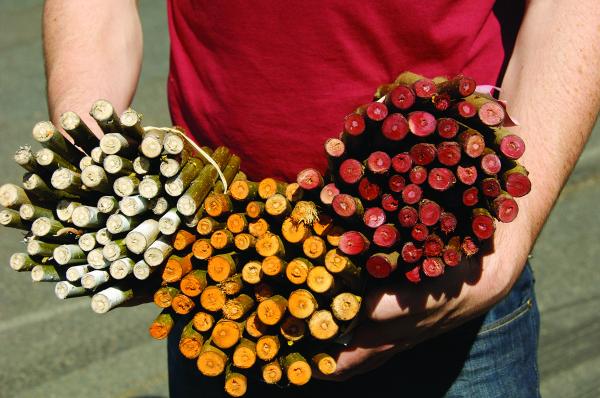IGFS exploring willow for agriculture in race to carbon net zero
In the run up to Cop26, scientists at IGFS are investigating a range of sustainable, natural resources with potential to greatly reduce agricultural emissions – by as much as 50%.

|
In the latest initiative, IGFS is pioneering the use of willow tree leaves in the race to make farming more carbon-neutral. The UK has committed to net-zero carbon emissions by 2050 but the National Union of Farmers has said it wants UK agriculture to achieve carbon-neutral by 2040. Cop26 will have a particular focus on reducing methane emissions. One of the clear benefits of willow is that it grows easily in the UK; it is already used as a bioenergy crop. Indeed, the Agrifood & Biosciences Institute (AFBI) NI, with whom IGFS will partner on this project, harvests willow for biomass, see pic (right). This project will take willow leaves and branches (up to 18mm diameter) left over from this process, and feed to ruminant livestock, sheep in the first instance, to see the effect on emissions. Early, in-vitro research at IGFS aimed to evaluate the nutritive value of different willow varieties and their potential to reduce emissions due to bioactive compounds (condensed tannins). Willow was compared with alfafa, a forage with no tannins. Results indicated a high reduction in methane emissions – around 50% – when compared with the alfalfa. The next stage is feeding willow silage directly to animals, with farm trials, using sheep, scheduled to begin in NI in early 2022. Both ammonia and methane emissions will be measured, along with nutrient value, digestibility and rumen microbiome in the indoors trial. Another aspect of the project will assess the efficacy of willow trees as part of ‘agroforestry’, where trees are grown in pasture areas so animals can graze naturally on the foliage. Agroforestry has become popular in places like New Zealand as part of a move towards ‘regenerative farming’, but there is a dearth of scientific data. As well as reducing the need for conventional silage, supporters point to other benefits – such as improving soil quality, biodiversity and extending the grazing season. IGFS lead on this project, Dr Katerina Theodoridou said the 4-year, BBRSC-funded research, in which Reading University is also a partner, was the culmination of much laboratory research. She said: “Willow definitely has great early potential but we need evidence from the farms – very little data currently exists on willow silage. “Measuring the effect of the bio-active compounds on emissions will give us urgently needed evidence that can be used in a practical way to make agriculture more sustainable.” |


 IGFS is already involved in a number of projects, local and international, investigating the use of seaweed as a feed supplement for farm animals in order to reduce GHG emissions. These projects are now entering the farm-trial stage and researchers expect results to evidence drops in methane and ammonia emissions of at least 30%.
IGFS is already involved in a number of projects, local and international, investigating the use of seaweed as a feed supplement for farm animals in order to reduce GHG emissions. These projects are now entering the farm-trial stage and researchers expect results to evidence drops in methane and ammonia emissions of at least 30%.